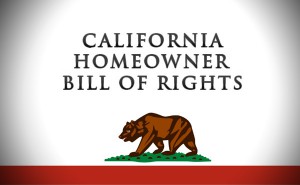New Bill Makes it Easier for Surviving Spouse to Fight Foreclosure
California Attorney General Kamala Harris is supporting a bill that expands the state’s Homeowners’ Bill of Rights. Under the expansion, the Homeowners’ Bill will include a provision designed to help surviving spouses and children stay in their homes after the primary mortgage holder passes away.
All too often, a couple buys a property but only one spouse signs the original loan documents and thus becomes the primary borrower. After the primary borrower passes away, the remaining spouse (typically the widow) is unable to pay the mortgage. As a result, the house is foreclosed.
The bill is known as the Homeowner Survivor Bill of Rights, Senate Bill 1150. If enacted, it would expand the current California Homeowners’ Bill of Rights to provide protections for homeowners against foreclosure. In that regard, the Survivor Bill is meant to protect surviving spouses and children from losing their home after losing their loved one.
Homeowner’s Bill of Rights
The California Homeowner Bill of Rights was enacted in 2012 to ensure fair lending and borrowing practices, and to guarantee basic fairness and transparency for homeowners in the foreclosure process. For example, mortgage servicers were restricted from taking steps to advance the foreclosure process if the homeowner was working on securing a loan modification. Another provision required purchasers of foreclosed homes to give tenants at least 90 days before starting eviction proceedings. 
In its current form, the survivor spouse is at risk of losing his or her home due to foreclosure. Recent hearings on the Homeowner Survivors’ Bill revealed banks insist on speaking with the primary mortgage borrower. Even if the primary borrower has passed, the bank would not modify the loan to include the surviving spouse because the deceased spouse could not sign the loan modification.
Other supporters of the Survivors Bill reveal they had to send their deceased spouse’s death certificate twenty-five times to the bank before the bank would consider modifying the loan. This difficult process has caused many grieving spouses additional pain, annoyance, and heartache.
How Does the Survivor Bill Fight Foreclosure?
The Homeowner Survivor Bill of Rights addresses what its sponsors have defined as a “loophole in California law that fails to provide surviving spouses and children important protections against foreclosure that are available to other homeowners.”
Under the Survivors Bill, the surviving spouse would be able to apply for both a loan assumption and loan modification and become the single point of contact with the lender. In other words, the spouse would be able to assume the loan and modify it without the deceased spouse having to sign paperwork after death or having to send the bank numerous copies of a death certificate to prove the deceased passed.
The proposed legislation also requires mortgage servicers to communicate with the heirs and spouse directly instead of allowing mortgage servicers to foreclose without attempting to speak with the deceased’s family. The new legislation notifies the surviving spouse that they can step in, assume the loan and keep their home instead of inundating them with paperwork and conflicting, confusing information.


Comments